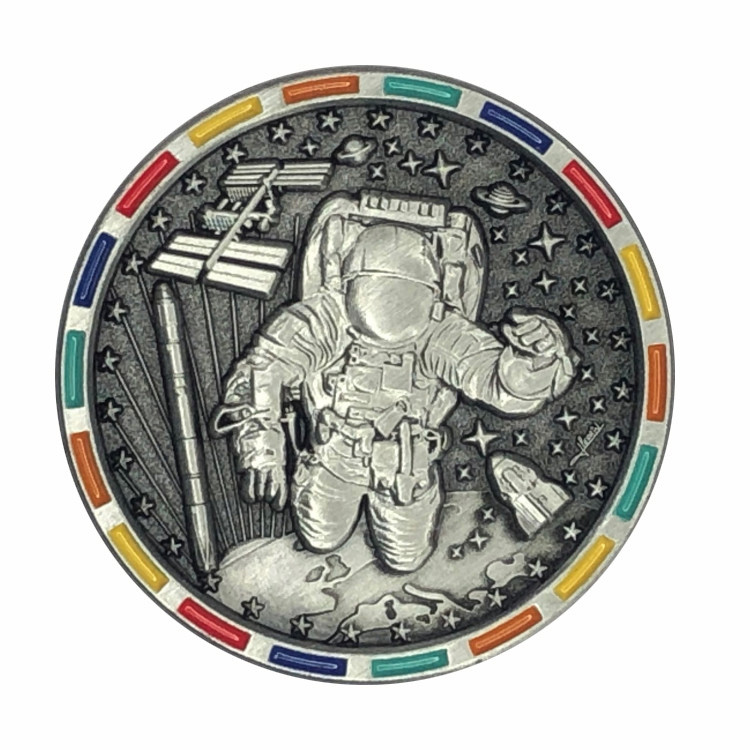



Napoleon mobile coin, world premiere. Napoleon Bonaparte, born August 15, 1769 in Ajaccio and died May 5, 1821
on Île Sainte-Hélène, was a soldier and a major statesman, the first emperor of the French from May 18, 1804 to
April 6, 1814 and from 20 March to June 22, 1815, under the name of Napoleon I.
As general-in-chief and head of state, Napoleon tried to break the coalitions set up and financed by the Kingdom
of Great Britain and which united, from 1792, the European monarchies against France and its regime born of the
Revolution. He led the French armies from Italy to the Nile and from Austria to Prussia and Poland: the many and
brilliant victories of Bonaparte (Arcole, Rivoli, Pyramides, Marengo, Austerlitz, Jena, Friedland), in rapid military
campaigns , dislocate the first four coalitions. The successive peace, which put an end to each of these coalitions,
strengthened France and gave Napoleon a degree of power which had hitherto rarely been equaled in Europe,
during the peace of Tilsit (1807).
Napoleon permanently reformed the State, restoring its authority and its primacy. France is undergoing major
reforms, which make Napoleon one of the founding fathers of contemporary French institutions. In this sense,
the Napoleonic codifications, including the Civil Code of 1804, made it possible to strengthen individual freedoms
or the equality of citizens before the law, by operating a synthesis by the guarantee of certain revolutionary gains
and the resumption of traditional principles resulting from the old regime. The French administration is reorganized, with the creation of prefects in the departments. Likewise, a new currency emerged, the franc, while the Banque de France was established. The Council of State is also created, just like the high schools.
Napoleon also tried to strengthen the French colonial empire of the Ancien Régime overseas. As the Haitian
Revolution turned into secession in this colony, Napoleon reestablished slavery in 1802, a restoration he wanted
provisional, in particular to prevent the independence of the island proclaimed by General Toussaint-Louverture.
Still for political reasons, Napoleon paradoxically sold Louisiana to the United States in 1803. However, he lost
most of the colonies that interested him against the English, and lost Saint-Domingue following the failure of the
expedition. prior military (1802-1803), aimed at fighting the separatists.
Napoleon brought the French territory to its maximum extension in Europe, with 134 departments in 1812,
transforming Rome, Hamburg, Barcelona or Amsterdam into chief towns of French departments. He was also
President of the Italian Republic from 1802 to 1805, King of Italy from 1805 to 1814, mediator of the Swiss
Confederation from 1803 to 1813 and protector of the Confederation of the Rhine from 1806 to 1813.
His victories enabled him to annex to France of vast territories and to govern most of continental Europe
by placing the members of his family on the thrones of several kingdoms: Joseph in Naples then in Spain,
Louis in Holland, Jérôme in Westphalia and his brother-in-law Joachim Murat in Naples. He also created a
Duchy of Warsaw, without formally restoring Polish independence, and temporarily subjected to his influence
defeated powers such as the Kingdom of Prussia and the Empire of Austria.
Object from his lifetime of a golden legend as a black legend, he owes his great notoriety to his military skill,
rewarded by many victories, and to his astonishing political trajectory, but also to his despotic and very centralized
regime as well. than its ambition, which results in deadly wars (in Portugal, Spain and Russia) with millions of
dead and wounded, military and civilians for the whole of Europe. He is considered one of the greatest
commanders in history, and his wars and campaigns are studied in military schools around the world.
While financing increasingly general coalitions, the Allies ended up winning decisive successes in Spain
(Battle of Vitoria) and Germany (Battle of Leipzig) in 1813. Napoleon's intransigence in the face of these setbacks
made him lose the support of entire sections of the French nation, while his former allies or vassals turned against
him. Brought to abdicate in 1814 after the capture of Paris, capital of the French Empire, and to retire to the island
of Elba, he tried to regain power in France, during the episode of the Hundred Days in 1815. Capable of
reconquering France and re-establishing the imperial regime there without striking a blow, he nevertheless,
following various betrayals and dissensions by his marshals, brought the country to a standstill with the heavy
defeat of Waterloo, which put an end to the Napoleonic Empire and ensures the restoration of the Bourbon dynasty. His death in exile, in Saint Helena, in the custody of the English, is the subject of many controversies.
A romantic tradition made Napoleon the archetype of the "great man" called to turn the world upside down.
This is how the Count de Las Cases, author of the Memorial of Saint Helena, attempts to present Napoleon
to the British Parliament in a petition written in 1818. Élie Faure, in his work Napoleon, which inspired Abel Gance,
compares him to a "modern day prophet". Other authors, such as Victor Hugo, make the vanquished of
Saint Helena the “modern Prometheus”. The shadow of "Napoleon the Great" hangs over many works of Balzac,
Stendhal, Musset, but also of Dostoyevsky, Tolstoy and many others. In addition, a French political current
emerges in the XIXth century, Bonapartism, claiming the action and the mode of government of Napoleon.
Napoleon mobile coin.
Specific References
8 other products in the same category:
Advice for properly stick your medal: remove the protective film and press strongly for 5 seconds, the surface must be perfectly clean before. The...
Advice for properly stick your medal: remove the protective film and press strongly for 5 seconds, the surface must be perfectly clean before. The...